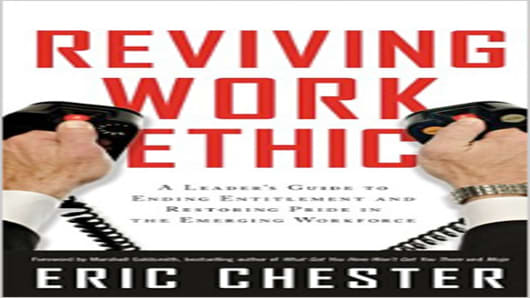GUEST AUTHOR BLOG: Employers Now Charged with Developing the Work Ethic Values that Used to Be Taught at Home by Eric Chester, Author of "Reviving Work Ethic – A Leader’s Guide to Ending Entitlement and Restoring Pride in the Emerging Workforce."
You’d be hard-pressed to find any politician whose campaign rhetoric doesn’t include the phrase ‘putting America back to work.’ But rather than waiting for our elected leaders to magically fabricate jobs out of thin air, maybe it’s time to address the much larger issue: America has forgotten how to work.
Pull any employer to the side and ask them to describe, in general, the work ethic that they see represented throughout their ranks and your apt to hear some colorful language.
Even the eternally optimistic warm and fuzzy managers wince a bit when the term work ethic enters the dialogue.
I interact with thousands of leaders, managers, business owners and execs each year and I’ve yet to find any who believe that the work ethic represented in the current labor pool stands up to that of the labor pool twenty, ten—or even five years ago.
These same employers, however, will openly lament the prevailing entitlement mentality of the emerging workforce that many decry is contagious, now rampant among X’ers and even baby boomers.
Is it any wonder that America’s largest export has become jobs?
There was a time when achievement meant more than possessions, and when character (a person’s inner qualities) was valued more than achievement. Americans felt good about putting in an honest day’s work for an honest day’s pay. This was the time when “Made in America” was the best label any product could bear, quality was everyone’s priority, and companies made decisions to ensure long-term stability—not short-term gains for stockholders.
I’m north of fifty and I remember that time. My four children (ages twenty-six to thirty-one) don’t.
"In a perpetual quest to separate effort from reward, the average employee is less concerned about the value they can provide to their employers and more concerned about what they can get from them.""
They’ve grown up in a world where most people work hard to find ways of avoiding hard work. They’ve heard stories telling how lottery winners, day traders, bloggers, dot-commers, and Internet marketers have managed to beat the system and derive a huge bounty with little or no effort. They’ve been inundated with reality television that turns talentless fools into millionaires in the blink of an eye and with the greatest of ease.
The impact of this value programming has created a mindset shift. Work is no longer the primary source of personal pride, but rather something to disdain, to shortcut, or to elude altogether. In a perpetual quest to separate effort from reward, the average employee is less concerned about the value they can provide to their employers and more concerned about what they can get from them.
Business owners, leaders, and managers can no longer afford to play employee roulette, gambling on the chances that they can find good people who’ve already learned a proper work ethic at home or at school. Like it or not, the burden of developing work ethic within the emerging workforce—and beyond—now rests upon their shoulders.
After hearing the collective sigh from thousands of managers, I wrote "Reviving Work Ethic".The book defines work ethic as “the intersection of cognizance (i.e. knowing what to do) and compliance (i.e. doing it, even when unsupervised).” Work ethic is marked by the seven indisputable core values every employer demands: positive attitude, reliability, professionalism, initiative, honesty, respect, and gratitude (cheerful service).
Although the book offers no silver bullet solutions, it clearly presents actionable ideas, techniques, and strategies to develop these core values in people and increase their performance, productivity, and service. Further, you’ll see that instilling these values not only makes employees more valuable to their organization, it also exponentially increases their value in the marketplace, so everybody wins.
It’s time to stop complaining about the lack of work ethic and take steps to revive it. The payoff for taking on the responsibility is huge. The downside for neglecting it is catastrophic.
Eric Chester is an award winning keynote speaker and the author of "Reviving Work Ethic: A Leader's Guide to Ending Entitlement and Restoring Pride in the Emerging Workforce." He is also the Founder and CEO of the Bring Your A Game to Work program. He can be contacted through www.RevivingWorkEthic.com
Email me at bullishonbooks@cnbc.com — And follow me on Twitter @BullishonBooks


